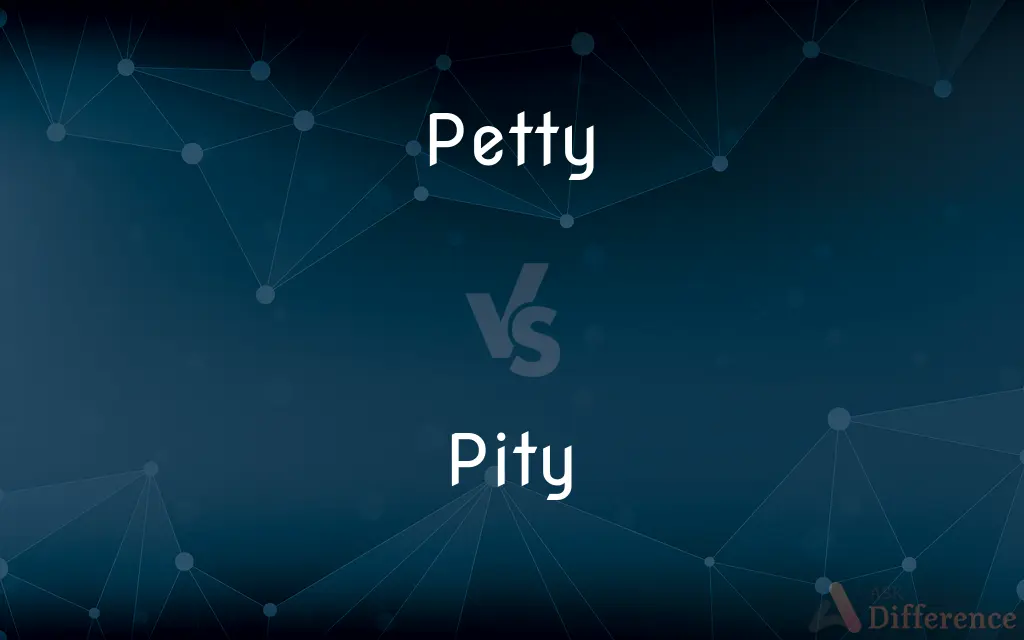Petty vs. Pity — What's the Difference?
By Tayyaba Rehman — Updated on September 27, 2023
"Petty refers to things that are of minor importance or trivial, e.g., petty complaints. Pity is a feeling of sympathy or sorrow for the suffering of others, e.g., she felt pity for him."

Difference Between Petty and Pity
Table of Contents
ADVERTISEMENT
Key Differences
The terms “Petty” and “Pity” hold entirely different meanings and applications in the English language. Petty is typically used to describe things of little or no importance, significance, or value, and it often implies a dismissive or belittling attitude towards the subject. For example, arguing over who gets the last piece of candy is often seen as a petty argument as it lacks significant consequence or value.
On the contrary, Pity is a noun representing a feeling of sorrow and compassion caused by the sufferings and misfortunes of others. It reflects a sense of sympathy and understanding towards someone who is experiencing hardship or pain. Pity is an emotional response that can lead to an action, like offering comfort or help to the person who is suffering.
While Petty has a generally negative connotation, implying a lack of substance or worth, Pity implies a compassionate and empathetic attitude towards others. A petty person is often considered narrow-minded and focused on trivial matters, whereas feeling pity is about acknowledging the pain or distress of others and may lead to offering support or assistance.
Petty is often used to describe behaviors, disputes, or concerns that are seen as unnecessarily overblown or focused on trivial matters. This word is usually associated with a lack of maturity or a narrow perspective. Pity, on the other hand, denotes a much deeper, humane emotional response, an expression of compassion and sympathy towards someone who is in a difficult or unfortunate situation.
In summary, while petty is an adjective describing triviality and insignificance often with a negative implication, pity is a noun symbolizing compassion and sympathy towards the suffering of others, emphasizing a humane, empathetic response to someone else’s misfortune.
ADVERTISEMENT
Comparison Chart
Part of Speech
Adjective
Noun
Meaning
Of little importance
Feeling of compassion for one in distress
Connotation
Negative
Neutral, Compassionate
Application
Describes trivial and insignificant matters or behaviors
Describes an emotional response to others’ suffering or pain
Expression
Reflects triviality and dismissiveness
Reflects sympathy and understanding
Compare with Definitions
Petty
Small-minded and narrow.
Her petty outlook prevents her from understanding the bigger picture.
Pity
A humane emotion reflecting concern and sorrow for others.
His heart was full of pity for the victims of the disaster.
Petty
Reflecting a lack of maturity or seriousness.
Ignoring someone over a small disagreement is very petty.
Pity
A feeling of sorrow for someone else’s suffering.
She looked at the wounded animal with pity.
Petty
Concerned with trivial matters.
He is so petty, always arguing over insignificant things.
Pity
Compassion for others in distress.
He felt a deep sense of pity for the homeless man.
Petty
Of little or no importance.
The manager dismissed the petty complaints of the employees.
Pity
Expression of condolence and sympathy.
Everyone expressed their pity for the bereaved family.
Petty
Of small importance; trivial
A petty grievance.
Pity
Sympathy and sorrow caused by the misfortunes of others.
It’s a pity to see someone so talented struggle so much.
Petty
Showing an excessive concern with unimportant matters or minor details, especially in a narrow-minded way
Petty partisanship.
Pity
Pity is a sympathetic sorrow evoked by the suffering of others, and is used in a comparable sense to compassion, condolence or empathy - the word deriving from the Latin pietās (etymon also of piety). Self-pity is pity directed towards oneself.
Petty
Of lesser importance or rank; subordinate
A petty prince.
Pity
Sympathy and sorrow aroused by the misfortune or suffering of another.
Petty
(Law) Variant of petit.
Pity
A matter of regret
It's a pity she can't attend the reception.
Petty
Having little or no importance.
A petty fault
Petty squabbles
Pity
To feel pity for or on account of
"No, he could not believe it a bad house.
Not such a house as a man was to be pitied for having" (Jane Austen). "An office worker pitied his confinement and slipped in to give him a loaf of bread" (Eric Scigliano).
Petty
Of persons or their behaviour: marked by or reflective of undesirably limited interests, sympathies, or views; begrudging, selfish, small-minded; also, preoccupied with subjects having little or no importance and not mindful of broader concerns.
Such literature may well be anathema to those who are too docile and petty for their own good.
That corporation is only slightly pettier than they are greedy, and they are overdue to reap the consequences.
Pity
To feel pity.
Petty
(historical) Of or relating to the lowest grade or level of school; junior, primary.
Pity
(uncountable) A feeling of sympathy at the misfortune or suffering of someone or something.
I can't feel any pity towards the gang, who got injured while attempting to break into a flat.
Take pity on someone
Petty
Little or small in size.
Pity
(countable) Something regrettable.
It's a pity you're feeling unwell because there's a party on tonight.
What a pity about the band breaking up. I loved them!
Petty
Secondary in importance or rank; minor, subordinate.
Petty cash
Petty officer
Pity
(obsolete) Piety.
Petty
An outbuilding used as a lavatory; an outhouse, a privy.
Pity
(transitive) To feel pity for (someone or something).
You have got to pity the guy - he lost his wife, mother and job in the same month.
Petty
(historical) A class or school for young schoolboys.
Pity
To make (someone) feel pity; to provoke the sympathy or compassion of.
Petty
A little schoolboy, either in grade or size.
Pity
Short form of what a pity.
Petty
Little; trifling; inconsiderable; also, inferior; subordinate; as, a petty fault; a petty prince.
Like a petty godI walked about, admired of all.
Pity
Piety.
Petty
Inferior in rank or status;
The junior faculty
A lowly corporal
Petty officialdom
A subordinate functionary
Pity
A feeling for the sufferings or distresses of another or others; sympathy with the grief or misery of another; compassion; fellow-feeling; commiseration.
He that hath pity upon the poor lendeth unto the Lord.
He . . . has no more pity in him than a dog.
Petty
(informal terms) small and of little importance;
A fiddling sum of money
A footling gesture
Our worries are lilliputian compared with those of countries that are at war
A little (or small) matter
Mickey Mouse regulations
A dispute over niggling details
Limited to petty enterprises
Piffling efforts
Giving a police officer a free meal may be against the law, but it seems to be a picayune infraction
Pity
A reason or cause of pity, grief, or regret; a thing to be regretted.
What pity is itThat we can die but once to serve our country!
Petty
Contemptibly narrow in outlook;
Petty little comments
Disgusted with their small-minded pettiness
Pity
To feel pity or compassion for; to have sympathy with; to compassionate; to commiserate; to have tender feelings toward (any one), awakened by a knowledge of suffering.
Like as a father pitieth his children, so the Lord pitieth them that fear him.
Petty
Insignificant and of minor consequence.
It's a petty issue and not worth our time.
Pity
To move to pity; - used impersonally.
It pitieth them to see her in the dust.
Pity
To be compassionate; to show pity.
I will not pity, nor spare, nor have mercy.
Pity
A feeling of sympathy and sorrow for the misfortunes of others;
The blind are too often objects of pity
Pity
An unfortunate development;
It's a pity he couldn't do it
Pity
The humane quality of understanding the suffering of others and wanting to do something about it
Pity
Share the suffering of
Common Curiosities
Is Petty used to describe trivial matters?
Yes, Petty is used to describe things of little or no importance or significance.
Is Petty generally used with a negative connotation?
Yes, Petty typically carries a negative connotation, implying a dismissive or belittling attitude.
Can Pity lead to offering support or assistance?
Yes, feeling Pity can lead to offering support, assistance, or comfort to those who are suffering.
Is a Petty person often considered narrow-minded?
Indeed, a person described as Petty is often perceived as narrow-minded and focused on trivial matters.
Does Pity imply a compassionate and empathetic attitude?
Absolutely, Pity implies a compassionate and empathetic attitude towards others in distress.
Does Pity express a feeling of sorrow for others?
Absolutely, Pity is a feeling of sorrow and compassion for the sufferings and misfortunes of others.
Can Petty be used to describe small amounts?
Yes, Petty can also refer to small amounts, such as in “petty cash,” which is a small amount of cash on hand.
Is Pity a noun or an adjective?
Pity is a noun, representing a feeling of sorrow and compassion.
Can Pity be expressed towards animals?
Yes, Pity can be felt and expressed towards any living being experiencing pain or distress, including animals.
Can Pity be experienced for oneself?
Yes, people can experience self-pity, which is feeling sorry for oneself due to perceived sufferings or misfortunes.
Can Petty describe insignificant behaviors or disputes?
Yes, Petty can describe behaviors, disputes, or concerns that are trivial and insignificant.
Is Petty associated with a lack of maturity?
Yes, being Petty is often associated with a lack of maturity and a focus on trivial matters.
Is it negative to feel Pity for someone?
Not necessarily. Pity can be a humane, compassionate response, but it can be perceived negatively if it’s seen as condescending.
Is being Petty a constructive attitude?
Generally, no. Being Petty usually implies focusing on trivialities and is not considered constructive.
Does feeling Pity always lead to action?
Not necessarily. While Pity can motivate people to act, it’s also possible to feel Pity without taking any action.
Share Your Discovery

Previous Comparison
Content vs. Concept
Next Comparison
Emu vs. LlamaAuthor Spotlight
Written by
Tayyaba RehmanTayyaba Rehman is a distinguished writer, currently serving as a primary contributor to askdifference.com. As a researcher in semantics and etymology, Tayyaba's passion for the complexity of languages and their distinctions has found a perfect home on the platform. Tayyaba delves into the intricacies of language, distinguishing between commonly confused words and phrases, thereby providing clarity for readers worldwide.
















































